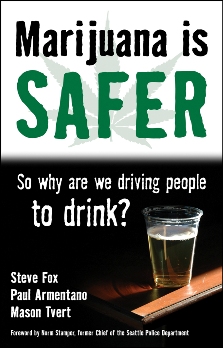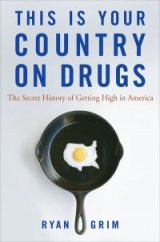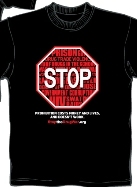A research report from the North American Opiate Maintenance Initiative (NAOMI) published this week in the New England Journal of Medicine finds that heroin is more effective than methadone for some hard-core addicts, but also that Dilaudid may work just as well. The report should only add to rising pressure to expand opiate maintenance programs in the US.
Three prominent marijuana reform activists have penned a very valuable new book, "Marijuana Is Safer -- So Why Are We Driving People to Drink?" They make a compelling argument, and they do it very nicely.
Last weekend's Seattle Hempfest is likely to have been the biggest one yet, as multitudes swarmed the waterfront for the two-day bash. But there are critics aiming at it, including a leading drug reformer and a former Hempfest organizer.
Every two years drug policy reformers from across the United States and around the world come to the International Drug Policy Reform Conference to listen, learn, network and strategize together for change. This year the conference is in Albuquerque, in November, and StoptheDrugWar.org is a partner.
As part of our summer fundraising drive, DRCNet is pleased to offer Ryan Grim's exciting new book, "This Is Your Country on Drugs: The Secret History of Getting High in America," as our latest membership premium. Things are happening, and the importance of your support at this time could not be greater.
A bill that decriminalizes the possession of small amounts of drug for personal use is now the law of the land in Mexico. Although there was some doubt President Calderon would approve it, it appeared in the official gazette Thursday. It also includes provisions to allow the state and localities to go after small-time drug dealers, a power previously reserved to the federal government.
There seems to be no end in sight to prohibition-related violence in Mexico. In fact, it just keeps getting worse.
A quiet week on the corrupt cops front, but the two stories we do have share a common theme: problems with snitches.
The Obama administration wants to eliminate the Safe and Drug-Free Schools competitive grants program because it is ineffective. So does the House of Representatives. But can proponents revive it in the Senate or conference committee?
Largely impelled by tireless medical marijuana advocate Carl Olsen, the Iowa Pharmacy Board Wednesday held the first in a series of public hearings about possibly rescheduling marijuana so it could be used as a medicine under state law.
Despite tough pot laws and harsh public condemnations of marijuana use in the media, Japan continues to see increasing numbers of marijuana arrests.
The death penalty for a couple pounds of pot?!?! It happened in Malaysia this week, and it's not the first time, either.
Events and quotes of note from this week's drug policy events of years past.
Do you read Drug War Chronicle? If so, we need your feedback to evaluate our work and make the case for Drug War Chronicle to funders. We need donations too.
Apply for an internship at DRCNet and you could spend a semester fighting the good fight!
In a report that was actually completed last October but not published until this week in the New England Journal of Medicine, researchers from the North American Opiate Medication Initiative (NAOMI) found that giving heroin under supervision to some hard-core drug addicts was more effective than giving them methadone. The study's publication in the prestigious peer-reviewed journal is already leading to calls for experiments with heroin maintenance in the US. To qualify for the study, participants had to have been addicted to heroin, Dilaudid, or another opiate for at least five years, have been injecting for at least the past year, have tried addiction treatment, including methadone maintenance, at least twice, and be at least 25 years of age. While researchers were loathe to generalize their findings, they described heroin maintenance as "a safe and effective treatment" for chronic addicts who have not taken to other forms of treatment.

Hastings St., downtown Vancouver (from vandu.org)
In the NAOMI project, researchers monitored 251 heroin addicts in Vancouver and Montreal and provided them with maintenance drugs for a year under the supervision of nurses, doctors, social workers, and psychiatrists. One hundred fifteen received pharmaceutical heroin (diacetylmorphine), 111 received methadone, and 25 received Dilaudid (hydromorphone).
Among participants who received heroin by injection, 88% completed the program compared to 54% of those receiving oral methadone. Similarly, illicit drug use rates dropped by 67% among those receiving heroin, compared to 48% among those receiving methadone.
"Our data show remarkable retention rates and significant improvements in illicit heroin use, illegal activity and health for participants receiving injection assisted therapy, as well as those assigned to optimized methadone maintenance," said Dr. Martin Schechter, principal investigator for the Center for Health Evaluation and Outcome Sciences at the University of British Columbia School of Population and Public Health and NAOMI's lead researcher. "Prior to NAOMI, all of the study participants had not benefited from repeated standard addiction treatments. Society had basically written them off as impossible to treat," he said.
"We now have evidence to show that heroin-assisted therapy is a safe and effective treatment for people with chronic heroin addiction who have not benefited from previous treatments. A combination of optimal therapies -- as delivered in the NAOMI clinics -- can attract those most severely addicted to heroin, keep them in treatment and more importantly, help to improve their social and medical conditions," explained Schechter.
The NAOMI research results mirror similar findings from a number of European countries, a fact noted in a Journal editorial by Virginia Berridge. "The results of this trial may be added to those from Germany, the Netherlands, Spain and Switzerland," Berridge wrote. "Switzerland has 10 years of experience in the prescription of heroin, and in a November 2008 referendum, 68% of voters were in favor of its continued prescription."
The NAOMI findings, along with earlier work from Europe, are relevant to the United States. According to government figures, nearly 700,000 Americans are heroin users, and 15% to 25% of them are heavy users who could benefit from prescription heroin.
But heroin is a Schedule I drug under the US Controlled Substances Act, which means it cannot legally be prescribed. That is unlikely to change anytime soon. Even allowing for a pilot program would require political decisions that are unlikely to be made in the foreseeable future.
That needs to change, said advocates of evidence-based drug policies. "The NAOMI results are clear that prescription heroin reduces crime, and overdose deaths," said Laura Thomas, deputy state director of the Drug Policy Alliance. "The reason this effective treatment isn't available in the United States right now is politics. The science is there."
"The success of NAOMI, combined with similar results in other countries, leaves little question that heroin prescription would reduce crime, and overdose fatalities in the United States as well," added DPA executive director Ethan Nadelmann. "Recent votes in Germany and Switzerland, combined with similar evidence of public support in other countries, show that the public will support even controversial drug policies when they have proven results. There is no question that heroin prescription programs are needed and long overdue in this country. All that stands in the way is ideology and the backward assumption that it can never happen in the United States."
It wasn't just DPA wondering about more effective forms of drug treatment. In a blog post titled Prescription Heroin?, New York Times science columnist John Tierney asked just that: Is it time for prescription heroin in the US? He didn't provide an answer, but the fact that the question is being asked by someone like Tierney is suggestive.
And if not prescription heroin, what about Dilaudid? It is Schedule II and can be prescribed, although not, under current law, for maintenance purposes. Schecter and his fellow researchers found that NAOMI participants could not distinguish it from heroin and that it appeared to be equally effective.
back to top
In the past few years, Colorado-based activist Mason Tvert has taken the notion of comparing marijuana to alcohol and used it to great success, first in organizing college students around equalizing campus penalties for marijuana and underage drinking infractions (marijuana offenses are typically punished more severely), then in running a successful legalization initiative in Denver in 2005. Tvert and his organization, SAFER (Safer Alternatives for Enjoyable Recreation), continue to hammer away at marijuana prohibition, and now, in collaboration with NORML analyst Paul Armentano and MPP director for state campaigns Steve Fox, he has taken his "marijuana is safer" campaign to a new level -- and, hopefully, to a new and broader audience.

Having known (and repeatedly interviewed) all three coauthors in the course of my duties for the Drug War Chronicle, I assumed "Marijuana Is Safer" would be a good book. I was mistaken. It's a great book, and an extremely useful one. "Marijuana Is Safer" starts out hitting on all eight cylinders with a foreword from former Seattle police chief Norm Stamper and never lets up. It hits its points concisely and engagingly, it is thoroughly researched, and its political arguments are carefully thought out.
Regular readers of the Chronicle may not expect to learn a lot that they didn't know already, but they will likely be surprised, especially when it comes to the deleterious effects of alcohol. Did you know about the nasty effects of acetaldehyde? I didn't. It's what you get when you metabolize ethanol (alcohol), and it's carcinogenic and damages internal organs. Because it is so damaging, the body breaks it down into acetate, but if you're drinking at the rate of more than a drink an hour, you're body starts lagging behind. Something to keep in mind the next time someone invites you to join a drinking contest.
Similarly, you may share the general conviction that alcohol use can lead to violence, disease, crime, and accidents, but "Marijuana Is Safer" offers up the hard numbers -- complete with footnotes. Here's just one hard number: 35,000. That's the number of deaths each year attributed to chronic alcohol consumption. We all know what the number of deaths attributed to chronic use of the chronic is, don't we? That's right, zero.
Armentano, Fox and Tvert offer a mix of history, science, medicine, media critique, and just plain straight talk as they survey the history of alcohol and marijuana use in America, discuss the differing attitudes toward the two drugs, explain the rise of marijuana prohibition, and, most centrally, compare and contrast the effects of the two drugs on individual consumers and society as a whole.
They also dissect the arguments that legalizers have used -- so far, unsuccessfully -- to try to end marijuana prohibition. While those arguments are perfectly valid, the coauthors argue that they cannot counter the objection of people who might otherwise be persuaded: Why should we legalize another vice?
Naturally enough, Armentano, Fox and Tvert have the answer: "We would not be adding a vice; we would be allowing adults the option to choose a less harmful alternative for relaxation and recreation," they write.
They also provide the "money quotes" for several other skeptical responses to a legalization pitch, all designed to highlight the comparison of alcohol and marijuana. And these three are extremely well-positioned to know what to say; all three have been engaging in this conversation for years.
The coauthors also make a compelling argument that the "marijuana is safer" approach is a winner precisely because it forces listeners to think about alcohol and what it does -- something that all Americans know quite a bit about even if they don't drink. The comparison of marijuana and alcohol brings the discussion down from lofty abstractions about freedom and liberty to real world experiences with America's most popular drugs.
The "marijuana is safer" approach works just fine for marijuana, but potentially subverts broader anti-prohibitionist politics. It is difficult to imagine an argument for drug legalization based on "methamphetamine is safer" or "heroin is safer." It also effectively throws up a wall between "soft" marijuana and "hard" other drugs, abandoning broader drug legalization for freeing the weed alone. But perhaps "abandoning" is the wrong word. After all, Armentano and Fox work for marijuana reform organizations -- not drug reform organizations -- and Tvert's work all along has been about marijuana.
But possible unhelpful side-effects for broader anti-prohibitionism aside, "Marijuana Is Safer" is extremely worthwhile. This is a book you can hand to your mother or your teacher or your preacher and provide him or her with a nice framework for looking at marijuana -- one that by its inexorable comparative logic leads to the inescapable conclusion that marijuana should be legalized.
And for those readers with an interest in activism, this book needs to be on your bookshelf. It's full of handy, well-documented facts, it's got the answers to the questions you're likely to hear, and it's even got a how-to activism section at the back. I guarantee that if you own this book, it's going to be very well-thumbed before very long.
back to top
Somewhere around 300,000 people converged on the Seattle waterfront Saturday and Sunday to attend the 19th annual Seattle Hempfest, the world's largest marijuana "protestival," as organizers like to call it. While organizers and drug reform advocates were out in force to encourage attendees to get involved in changing the marijuana laws, for most of the crowd, Hempfest was one big pot party. And that has some movement critics unhappy.

Hempfest crowd
Last year's attendance was estimated at 310,000. While figures are not yet in for last weekend's event, given the huge crowds, it is likely this year's figure will be even higher.
With hundreds of vendors selling glass pipes, bongs, tie-dyes, and assorted other pot-related paraphernalia, as well as dozens of food vendors, with seven stages alternating musical acts with activist speakers, and with crowds so thick that people literally could not move at some points by mid-afternoon on both days, Hempfest seems more like a dense urban community than a festival. And like any urban community, Hempfest had a police presence, but as far as can be determined, police couldn't find anyone to arrest despite the ever-present scent of marijuana smoke in the air.
That's in part because Seattleites voted in 2003 to make adult marijuana offenses the lowest law enforcement priority. But it is also in part because, unlike some other police forces, the Seattle police actually acknowledge and heed the will of the voters. In all of last year, Seattle police arrested only 133 people for marijuana possession -- and those were all people who had already been detained on other charges.
It is that tolerant attitude toward marijuana that makes the massive law-breaking at Hempfest possible. In almost any other city in the US, such brazen defiance of the drug laws would almost certainly result in mass arrests. Even this weekend's Boston Freedom Rally, the second largest pro-marijuana event in the country, will see numerous arrests -- if police behavior in the past is any indicator.

Hempfest-targeted sky ad, pulled by helicopter
Drug reform organizations including
NORML,
Students for Sensible Drug Policy and
StoptheDrugWar.org (publisher of this newsletter) were present with booths or tables, as were numerous medical marijuana support groups. But those booths and tables had to compete with bong-sellers and pipe-makers, t-shirt vendors and hippie couture outlets, and the hundreds of other vendors cashing in on the crowds.
To really get the drug reform message out, Hempfest organizers and reform activists took to the various stages between acts to exhort audiences to make Hempfest a party with a purpose. Among the nationally known activists speechifying at Hempfest were "Radical Russ" Belville of NORML, Sandee Burbank of Mothers Against Misuse and Abuse, Mike and Valerie Corral of the Wo/Men's Alliance for Medical Marijuana (WAMM), Debbie Goldsberry of the Berkeley Patients Group, Washington state legislator and head of the Voluntary Committee of Lawyers Roger Goodman, medical marijuana specialist Dr. Frank Lucido, former medical marijuana prisoner Todd McCormick, cannabis scientist Dr. Robert Melamede, and NORML founder Keith Stroup and current executive director Allen St. Pierre. For a complete list of speakers, go here.
Activists also educated those interested in learning more about marijuana law reform and related topics at the Hemposium tent, which featured panels on "Human Rights for Cannabis Farmers, Dispensers and Consumers," "Global Hempenomics," "Cannabliss: An Entheogen for the Ages," "Cannabis and the Culture Wars: The Coming Truce," and "Cannabis Coverage: Reefer Sanity for the 21st Century." For a complete list of Hemposium panels, click here.
While Hempfest came off without any serious problems, it has sparked a couple of related controversies. This week, Criminal Justice Policy Foundation head Eric Sterling wrote a blog post, Hempfest is Huge, But is It Good Politics?, in which he answered his own question with a resounding "no." Hempfest and similar rallies are "a political fraud," he wrote. Even worse, they are "advertisements for irresponsible drug use."

''Hemposium,'' with speakers (l-r): Reason's David Nott, SAFER's Mason Tvert, journalist Fred Gardner and Chronicle editor Phil Smith
Similarly, former Hempfest organizer Dominic Holden stirred the pot the week before Hempfest with an article in the Seattle Stranger,
A Few Words About Hempfest, in which he complained it was a "patchouli-scented ghetto" and overly countercultural. Like Sterling, Holden saw the hippiesque trappings of Hempfest as counterproductive. "Countercultural celebrations and drug legalization advocacy are mutually undermining ambitions," he wrote.
Hempfest organizers were not amused, and on Sunday, Holden was removed from the back of the Main Stage by unhappy erstwhile comrades. They explained why in an interview with Steve Bloom's Celebstoner, and Holden continued the spat with his own interview.
Perhaps the organizers of Hempfest and similar events will listen to Sterling and Holden, but probably not. Hempfest is a celebration of the pot-smoking counterculture, and it's not likely to go away or change its ways because a guy in a suit and a disaffected former friend are unhappy with how it operates. Straight-laced drug reformers will most likely just have to put up with Hempfest and its pot-happy ilk. They can treat it like the crazy aunt in the attic, but they can't get rid of it.
back to top
StoptheDrugWar.org (DRCNet) is pleased to be a partner in the upcoming 2009 International Drug Policy Reform Conference, this November 12-14 at the Hyatt Regency in Albuquerque, New Mexico.
The Reform Conference, sponsored by our friends at the Drug Policy Alliance, is the major biennial gathering of drug policy reformers of all kinds. The last one, held in New Orleans in 2007, brought together over 1,000 attendees representing 25 different countries. This year attendees will have the opportunity to spend three days interacting with people committed to finding alternatives to the war on drugs while participating in sessions given by leading experts from around the world. Click here to register -- early bird rates are available through October 9, and discounts are available for students and New Mexico residents.
Some testimonials from the 2007 conference:
"The conference was a tremendous educational experience. I established tons of contacts and look forward to a future dedicated to fighting the drug war."
"Lots of great energy! This was my very first conference and I would most definitely recommend it to any health care professional desiring information on this subject. The speakers were very educated on their subjects and readily available to answer questions."
"This conference has been an incredible experience. The level of knowledge and experience from the presenters has been fantastic."
"I thought the conference was a wonderful collaboration of minds and knowledge on the multiple aspects of drug policy. I enjoyed having applicable speakers on both sides of the debate of policy and drug reform."
"This conference exceeded my expectations in every way possible. As a first year attendee I had no idea what I would learn."
"Once again, thank you for the most exciting and informative conference in the world."
Hope to see you there.
back to top
Dear friend of drug law reform,
As part of our summer fundraising drive, we continue to offer Ryan Grim's exciting new book, "
This is Your Country on Drugs: The Secret History of Getting High in America," as our latest membership premium.
Donate $36 or more and we will send you a complimentary copy of "This is Your Country on Drugs" as our thanks.
From the antebellum temperance movement, to the unintended consequences of Nixonian and Reaganite anti-drug efforts, to the hard-to-explain '00s LSD shortage, "This is Your Country on Drugs" is an entertaining, enlightening, and accessible account of America's love-hate relationship with psychoactive substances ranging from the nation's beginnings to the present day.
Your support will come at an historic and critical moment. A moment when Congress is moving on a wide range of important reforms to drug policy. When the prohibition debate is reaching new heights. But when despite it all the new drug czar continues to talk nonsense like the old drug czar. I encou
rage you to join us today as we fight this important fight at this important time.
Our ability to bring drug war injustices to the attention of major media, to promote policy change in Congress, to reach millions of people online each year -- all of these are possible because of, and depend on, you.
We continue to offer our exciting new t-shirts that make the point about prohibition and the drug war. For a contribution of $36, you can choose either of our new StoptheDrugWar.org T-shirts pictured to the right — "Prohibition Doesn't Work" or "STOP" (click on images for an enlarged view). For a gift of $60 or more, you can receive both t-shirts. For a contribution of $90 or more, you can receive both shirts and Ryan Grim's book as our thanks, or substitute any item from the StoptheDrugWar.org inventory.
Your membership today will make an immediate impact by helping StoptheDrugWar.org (DRCNet):
- Produce more internet videos like "SWAT Raids -- No One is Safe" and fund more actions like our upcoming News Rewriting Project.
- Grow the groundswell for change by helping grassroots organizations — our movement's "boots on the ground" — reach out to more people.
- Pressure the Obama Administration to make good on all of its promises and lobby Congress to make smart funding choices by providing the truth about the Drug War.
- Break more records! With each improvement to our web site, we become an even more powerful resource for anyone (including media and politicians) to find information about the Drug War.
What you and I and our friends are doing together is working. We can't back off now. By taking advantage of the opportunity we have during this pro-reform climate, we can change minds, change laws and, most importantly, change good people's lives.
Thank you very much,

David Borden
Executive Director, StoptheDrugWar.org (DRCNet)
 P.S. It's time to stop wasting time, money and good people's lives. Please join us in "Changing Minds, Laws & Lives" by adding
your support to StoptheDrugWar.org while we have this unique opportunity. Thank you!
P.S. It's time to stop wasting time, money and good people's lives. Please join us in "Changing Minds, Laws & Lives" by adding
your support to StoptheDrugWar.org while we have this unique opportunity. Thank you!
back to top
A bill that decriminalizes the possession of small amounts of drugs for personal use in Mexico is now the law of the land, although it will not go into effect for one year to give states time to adjust their laws. It was published Thursday in the Official Daily of the Federation, the Mexican equivalent of the Federal Register. (To read the complete text of the bill in Spanish, go to page 83 of the Official Daily.
According to the new law, the amounts of various drugs decriminalized for personal use are:
- opium -- 2 grams
- cocaine -- 1/2 gram
- heroin -- 1/10 gram
- marijuana -- 5 grams
- LSD -- 150 micrograms
- methamphetamine -- 1/5 gram
- ecstasy -- 1/5 gram

''Global Marijuana Day'' demonstration in Mexico City, May 2008
The decriminalization measure is part of a broader bill aimed at reducing "narcomenudeo," or retail drug sales. The bill would allow states and localities to prosecute small-time drug dealing offenses, a power that currently resides only with the federal government. It also allows police to make drug buys to build cases, a break with precedent in Mexico.
Whether the overall bill is a step forward or a step back is open to debate. Read our earlier discussion of the bill here.
back to top
by Bernd Debusmann, Jr.
Mexican drug trafficking organizations make billions each year trafficking illegal drugs into the United States, profiting enormously from the prohibitionist drug policies of the US government. Since Mexican president Felipe Calderon took office in December 2006 and called the armed forces into the fight against the so-called cartels, prohibition-related violence has killed over 12,000 people, with a death toll of over 4,000 so far in 2009. The increasing militarization of the drug war and the arrest of several high- profile drug traffickers have failed to stem the flow of drugs -- or the violence -- whatsoever. The Merida initiative, which provides $1.4 billion over three years for the US to assist the Mexican government with training, equipment and intelligence, has so far failed to make a difference. Here are a few of the latest developments in Mexico's drug war:

Mexican anti-drug patrol
-Four People , including a serving member of the US Army and a 16-year old boy, were arrested this week in the May 15 slaying of a Juarez cartel lieutenant and government informant. The men were apparently paid some $10,000 dollars to participate in the assassination of Jose Daniel Gonzalez Galeana.
Friday, August 14:
-19 people were killed and 20 wounded in a prison fight in Durango. Many of the victims were killed by bullets from firearms that had been smuggled into the prison. Reports indicate that the clash may have been a "dispute for dominance" among inmates incarcerated on organized crime and drug trafficking charges.
Saturday, August 15:
-In Monclova, Coahuila, three bodyguards were killed during an attack on an ex-general who serves as police chief. Gunmen in pickup trucks attacked Monclova police chief Juan Carlos Pacheco as he headed home Friday evening. Pacheco was unharmed in the attack.
-In the state of Mexico (which surrounds most of Mexico City), federal police apprehended Héctor Manuel Oyarzabal Hernández, reportedly a high-ranking member of La Familia. Oyarzabal reportedly handled drug-trafficking in the cities of Ixtapaluca, Chalco, Valle de Chalco and Ozumba, all of which are in the greater Mexico City metropolitan area. Seven other men were arrested alongside him, along with several automatic weapons, two motorcycles, three SUVs and hundreds of rounds of ammunition. The Mexican government had increased operations against La Familia since the July 13 discovery of 12 federal police officers killed by the organization.
-Carlos Ocaranza, a musician who specialized in narco-corridos (ballads that glorify the deeds of drug traffickers), was shot dead as he left a concert in Guadalajara. The attack also killed his manager, who succumbed to his wounds on Monday. Ocaranza was also known as "Crazy Elizalde", a reference to his distant relative Valentin Elizalde, an extremely popular musician who was murdered in 2006.
Sunday, August 16:
-Hundreds of Mexican customs officials working at airports and border crossings were replaced by the Mexican government. The operation was aimed at rooting out corrupt inspectors who facilitate the flow of drugs, arms and money into and out of Mexico. Reforma reported that 1,100 officers were ousted, to be replaced by new personnel that had undergone extra training and background checks. The ousted officers were not fired. Instead, their contracts were not renewed. This is part of a larger effort on the part of the Calderon government to fight corruption in Mexico. In the past, entire police departments were replaced by military personnel, and politicians with alleged ties to drug cartels and other organized criminal networks have been arrested.
Monday, August 17:
- 33 people were killed in drug related violence across northern Mexico on Sunday and Monday. In Ciudad Juarez, eight people were killed when gunmen burst into a bar and shot dead the owner, his wife, and six customers. Two other males, aged 20 and 25, were killed in the center of Ciudad Juarez in the afternoon. In the town of Praxedis (36 miles from Ciudad Juarez), heavily armed gunmen in black uniforms assaulted a house, killing six. Several other killings were reported in different parts of Chihuahua, of which Ciudad Juarez is the capital. Additionally, four people were killed during a two-hour firefight with police and military elements in the northern province of Nuevo Leon.
-In the resort town of Cozumel, suspected cartel assassins killed four men. The bodies, which showed signs of torture, were found in a car. Cozumel, which is roughly 12 miles from the mainland, has seen very little drug-related violence in recent years.
Tuesday, August 18:
-A father and his four-year old son were killed after being attacked by gunmen as they drove on a highway near Ciudad Juarez. The mother was wounded and taken to the hospital. Later on Tuesday, several banners appeared in Ciudad Juarez denying that cartels were responsible for civilian deaths. In neighboring Coahuila state, gunmen attacked the offices of the Siglo de Torreon newspaper. Nobody was injured in the attack.
-American investigators announced on Tuesday that they believe that the recent wildfire in Santa Barbara, California was started by marijuana growers with possible connections to Mexican drug cartels. A cooking device left at one of the grow-ops was found to be the cause of the flame. Additionally, 30,000 marijuana plants and an AK-47 rifle were found near the origin of the blaze in Los Padres National Forest. US Forest Service Special Agent Russ Arthur said that although this is the first large wildfire known to have been caused by marijuana grow-ops, they do cause, on average, three to four smaller fires in California each year.
Total reported body count for the last week: 219
Total reported body count for the year: 4,432
Read last issue's Mexico drug war report here.)
back to top
A quiet week on the corrupt cops front, but the two stories we do have share a common theme: problems with snitches. Let's get to it:
In Gaffney, South Carolina, a Cherokee County sheriff's officer was arrested Tuesday and fired Wednesday for exchanging drugs for sex with a female confidential informant. Now former Officer Troy Cooper, 56, is accused of providing marijuana, money, and other contraband to the informant in return for sexual favors between March 2008 and last week. Investigators from the State Law Enforcement Division (SLED) were called in by Sheriff Bill Blanton. A search warrant in the case indicates that SLED has recorded telephone conversations between Blanton and the informant.
In St. Louis, police commanders are at odds with the police union over departmental demands that up to 20 officers reveal details about their confidential informants. The department has acknowledged in court filings that "one or more" officers "have included false information in affidavits" for warrants, and says the investigation is aimed at stopping "the concerns of police abuse and violation of civil rights." At least two officers, Shell Sharp and William Noonan, have already resigned, and prosecutors have dropped 39 cases in which one or the other officer was involved. But the police union has won a temporary restraining order to block the revealing of informant information, saying it would endanger snitches and officers. Whether they can win a permanent injunction will be decided next week.
back to top
House and Senate appropriators have agreed to ax only 11 of 48 non-military discretionary spending programs targeted for elimination by the Obama administration, but funding for the Safe and Drug-Free Schools community grants program is one of them. That's what Congress Daily determined following an analysis of fiscal year 2010 budget documents and appropriations bills.
In May, the Obama administration compiled a budgetary hit list of 121 programs, military and non-military, that it recommended be cut or eliminated completely. The $295 million for Safe and Drug-Free Schools community grants was among those programs recommended for total elimination. The administration will continue funding the Safe and Drug-Free Schools National Program.
In recommending termination of the community grants program, the Obama administration argued that "while reducing violence and drug use in and around schools is a compelling goal, reviews by an independent evaluator and by a statutory advisory committee have demonstrated that this program is poorly matched to achieving that goal." It cited a 2001 RAND Drug Policy Research Center study that described the program as "profoundly flawed" and a 2007 Safe and Drug-Free Schools advisory committee study that affirmed the RAND findings.
"The program does not focus on the schools most in need and the thin distribution of funding prevents many local administrators from designing and implementing meaningful interventions," the White House said in its budget.
Both the House and Senate Appropriations Committees agreed with the White House and zeroed out the program. The House education appropriations bill has already passed, but the Senate bill is still in process. Proponents of the program may still try to reinstate it in the Senate or during the conference committee to reconcile the House and Senate appropriations bills.
back to top
Medical marijuana advocates were out in force Wednesday in Des Moines as the Iowa Pharmacy Board held the first in a series of public hearings on whether the state should reschedule marijuana from Schedule I (no medical use, high abuse potential) to Schedule II (medical use, high abuse potential). The board will make recommendations to the state legislature later this year.

Carl Olsen
The hearings are part of the board's review of the scientific evidence around the medicinal use of marijuana, a review that will also examine state and federal laws. The review comes after the board last month again rejected a petition from Carl Olsen of
Iowans for Medical Marijuana to remove marijuana from Schedule I. The board had earlier rejected a similar petition, but a Polk County (Des Moines) judge in April ordered the board to reconsider.
Olsen argued that because medical marijuana is legal in 14 states it no longer meets the definition of a Schedule I drug. The board disagreed, saying that marijuana would have to be legal in all 50 states and under federal law for it to be rescheduled. But it did agree to review the evidence. The public hearings are part of that process.
Wednesday's hearing in Des Moines featured poignant testimony from patients as they pleaded with the board to stop treating them like criminals for using marijuana to treat pain and other conditions. "People are suffering who need not suffer. People are rotting in jail who should not be there," said Kevin Feeley of Ames in remarks reported by the Des Moines Register. Feeley said he used marijuana to ease his suffering from spinal cancer.
Feeley joined other speakers in telling the board that marijuana is safer and less addictive than many prescription medications. They urged the board to help Iowa join the ranks of states where patients are allowed to use marijuana with a doctor's recommendation.
Robert Manke of Des Moines said he used marijuana for pain relief from injuries caused by traffic accidents and to reduce nausea from prescription medications. "I know what it's like to crawl around on the bathroom floor like an animal in the morning, vomiting with my head in the stool," he said. "I need your help. I'm not here because I want to get high. I'm here because I want to stop being sick. And I want to stop being persecuted."
It wasn't just patients. Several doctors testified in support of medical marijuana Wednesday, including Dr. Edward Hertko, a retired physician, who echoed that marijuana is less dangerous and addictive than many common prescription drugs. It wasn't about getting high, he said. "The people who want recreational marijuana already know how to get it," Hertko noted.
Not everyone was on board. Representing the Iowa Elks Association, Gary Young warned that allowing for medical marijuana could make it easier for people, including young people, to get ahold of it. He also challenged the plant's medical efficacy and argued that prescription drugs are more pure and easier to control than smoked marijuana. "I urge the board to make its decision on scientific evidence and not on anecdotal evidence," he said.
The Governor's Office of Drug Control Policy did not testify at the hearing, but offered a written statement in opposition. The office position is that the science so far does not support using marijuana as a medicine. As its web site notes: "Unless, or until, the consensus of medical evidence changes, ODCP opposes any proposal to legalize marijuana smoking for medical purposes."
The three remaining public hearings are September 2 in Mason City, October 7 in Iowa City, and November 4 in Council Bluffs.
back to top
Japan's National Police Agency reported Thursday that marijuana arrests were at an all-time high during the first six months of this year. Police said 1,446 were arrested for possessing, using or trafficking in marijuana, up 21.3% from a year earlier. Of those arrested for pot offenses, 63.2% were under the age of 30, suggesting that marijuana use is spreading among young people.
One hundred four people were arrested for marijuana cultivation, up 40.5% over the same period last year. Home cultivation of marijuana is assisted by the availability of seeds and grow supplies over the Internet and by consumers' fears of venturing into illicit drug markets.
The 40.5% increase in grow busts in the first half of this year comes after a 50% increase in grow busts during the first half of last year.
The record arrest figures come as Japan comes to grip with a growing marijuana culture. In the past couple of years, the country has seen repeated "scandals" around marijuana use, including the expulsion of three Russian wrestlers from sumo competition for smoking pot, the arrests of various celebrities, and a national freak-out over students at prestigious universities smoking pot.
The apparent increase in marijuana use in Japan comes despite mass media denunciations of it and despite harsh drug laws. Under the 1948 marijuana control law, any pot offense can earn a prison term of up to 10 years.
back to top
A Malaysian court has sentenced a Thai woman to death for trafficking 1.04 kilograms of marijuana. Under the country's draconian Dangerous Drugs Act of 1952, any drug trafficking offense garners a mandatory death sentence.
The ruling came Wednesday at the High Court in Kota Baru. Judge Datuk Muhamad Ideres Muhamad Rapee ordered the sentence after the prosecution managed to prove a prima facie against Roseedah Cheubong, 41, who was crying as the sentence was issued.
The court ignored the pleas of Roseedah's attorney, Zamri Mat Nawang, who told it she was a single mother trying to fend for herself and her teenage child and that she was sorry for what she had done. Instead, it listened to deputy prosecutors Wan Abad Razak Wan Hussin, who called for the mandated penalty because of the "gravity" of the offense.
Roseedah has been jailed since she was arrested in February 2004 for selling a kilogram of weed outside a gas station. No word yet on possible appeals.
The provincial High Court sentence came little more than a week after the Malaysian Federal Court upheld the death sentence of a taxi driver for trafficking less than two kilos of marijuana. According to the anti-death penalty organization Hands Off Cain, so far this year, Malaysian courts have imposed the death sentence 12 times. Only two death sentences were for murder. The other 10 were for drug trafficking, and eight of those were for trafficking marijuana.
Human rights and harm reduction groups have organized an international campaign to end the death penalty for drug offenses. Read about it here. Since Malaysia does not make a habit of publicly announcing executions, it is unclear how many of the marijuana traffickers sentenced to death have actually been executed.
back to top
August 23, 1839: The United Kingdom captured Hong Kong as a base as it prepared for war with Qing China. The ensuing 3-year conflict was later known as the First Opium War.
August 25, 2001: The Denver Post reports that US District Judge John L. Kane, Jr. said: "The best way for a kid who is caught using or selling drugs to get off is to select a congressman, senator or high-ranking official as one's parent." Indeed, after the son of the now-disgraced US Rep. Randy "Duke" Cunningham (R-CA), was found flying an airplane loaded with 400 pounds of marijuana, he was freed on bail but then tested positive for cocaine three times. He wound up getting 2 1/2 years in prison -- a long time, but not by the standards of US criminal justice today. Former Education Secretary Richard Riley's son got just six months' house arrest for conspiring to sell cocaine and marijuana, though he had been indicted earlier on charges that can lead to life in prison.
August 27, 2002: Canadian Press, Canada's national newswire, reports that Health Minister Anne McLellan said the federal government is not backing away from its plan to supply patients with medical marijuana. Bristling earlier reports that the project had been shelved, McLellan said, "In fact, far from shelving it, what we're doing is implementing the second stage."
August 22, 2003: David Borden, Executive Director of StoptheDrugWar.org, writes an open letter to the Chief Judge of the Superior Court of the District of Columbia, Rufus G. King III, stating his refusal to serve jury duty. "... I have determined that unjust drug laws, and the corrosion wrought by the drug war on the criminal justice system as a whole, compel me to conscientiously refuse jury service," says Borden. Visit http://stopthedrugwar.org/openletter to read the full letter.
back to top
Do you read Drug War Chronicle? If so, we'd like to hear from you. DRCNet needs two things:
- We are in between newsletter grants, and that makes our need for donations more pressing. Drug War Chronicle is free to read but not to produce! Click here to make a donation by credit card or PayPal, or to print out a form to send in by mail.
- Please send quotes and reports on how you put our flow of information to work, for use in upcoming grant proposals and letters to funders or potential funders. Do you use DRCNet as a source for public speaking? For letters to the editor? Helping you talk to friends or associates about the issue? Research? For your own edification? Have you changed your mind about any aspects of drug policy since subscribing, or inspired you to get involved in the cause? Do you reprint or repost portions of our bulletins on other lists or in other newsletters? Do you have any criticisms or complaints, or suggestions? We want to hear those too. Please send your response -- one or two sentences would be fine; more is great, too -- email [email protected] or reply to a Chronicle email or use our online comment form. Please let us know if we may reprint your comments, and if so, if we may include your name or if you wish to remain anonymous. IMPORTANT: Even if you have given us this kind of feedback before, we could use your updated feedback now too -- we need to hear from you!
Again, please help us keep Drug War Chronicle alive at this important time! Click here to make a donation online, or send your check or money order to: DRCNet, P.O. Box 18402, Washington, DC 20036. Make your check payable to DRCNet Foundation to make a tax-deductible donation for Drug War Chronicle -- remember if you select one of our member premium gifts that will reduce the portion of your donation that is tax-deductible -- or make a non-deductible donation for our lobbying work -- online or check payable to Drug Reform Coordination Network, same address. We can also accept contributions of stock -- email [email protected] for the necessary info.
back to top
Want to help end the "war on drugs," while earning college credit too? Apply for a StoptheDrugWar.org (DRCNet) internship for this summer or fall semester and you could come join the team and help us fight the fight!
StoptheDrugWar has a strong record of providing substantive work experience to our interns -- you won't spend the summer doing filing or running errands, you will play an integral role in one or more of our exciting programs. Options for work you can do with us include coalition outreach as part of the campaign to rein in the use of SWAT teams, to expand our work to repeal the drug provision of the Higher Education Act to encompass other bad drug laws like the similar provisions in welfare and public housing law; blogosphere/web outreach; media research and outreach; web site work (research, writing, technical); possibly other areas. If you are chosen for an internship, we will strive to match your interests and abilities to whichever area is the best fit for you.
While our internships are unpaid, we will reimburse you for metro fare, and DRCNet is a fun and rewarding place to work. To apply, please send your resume to David Guard at [email protected], and feel free to contact us at (202) 293-8340. We hope to hear from you! Check out our web site at http://stopthedrugwar.org to learn more about our organization.
back to top












